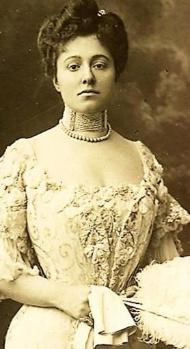Cine s-a întâlnit cu Gabriele D'Annunzio?
Eleonora Duse datează Gabriele D'Annunzio de la ? până la ?. Diferența de vârstă a fost de 4 ani, 5 luni și 9 zile.
Maria Gravina Cruyllas datează Gabriele D'Annunzio de la ? până la ?. Diferența de vârstă a fost de 1 ani, 10 luni și 10 zile.
Alessandra Starabba di Rudinì datează Gabriele D'Annunzio de la ? până la ?. Diferența de vârstă a fost de 13 ani, 6 luni și 23 zile.
Margherita Besozzi di Castelbarco datează Gabriele D'Annunzio de la până la ?. Diferența de vârstă a fost de 29 ani, 8 luni și 5 zile.
Gabriele D'Annunzio

General Gabriele D'Annunzio, Prince of Montenevoso (UK: , US: ; Italian: [ɡabriˈɛːle danˈnuntsjo]; 12 March 1863 – 1 March 1938), sometimes written d'Annunzio as he used to sign himself, was an Italian poet, playwright, orator, journalist, aristocrat, and Royal Italian Army officer during World War I. He occupied a prominent place in Italian literature from 1889 to 1910 and in its political life from 1914 to 1924. He had the epithets il Profeta (The Prophet) and il Vate (The Poet): vate stems from the Latin vates, meaning a prophetic, divinatory, or inspirational poet.
D'Annunzio was associated with the Decadent movement in his literary works, which interplayed closely with French symbolism and British aestheticism. Such works represented a turn against the naturalism of the preceding romantics and was both sensuous and mystical. He came under the influence of Friedrich Nietzsche, which would find outlets in his literary and later political contributions. His affairs with several women, including Eleonora Duse and Luisa Casati, received public attention. In his politics, which evolved many times, he associated himself with socialism and the progressivist views of the political left, responding to the illiberal and reactionary policies of Luigi Pelloux, as well as with the Historical Far Left.
During World War I, D'Annunzio's image in Italy transformed from literary figure to national war hero. He was associated with the elite Arditi storm troops of the Italian Army and took part in actions such as the Flight over Vienna. As part of an Italian nationalist reaction against the Paris Peace Conference of 1919, he set up the short-lived Italian Regency of Carnaro in Fiume with himself as Duce. The Charter of Carnaro made music the fundamental principle of the state, which was corporatist in nature. Although D'Annunzio later preached nationalism and never called himself a fascist, he has been credited with partially inventing Italian fascism, as both his ideas and his aesthetics were an influence upon Benito Mussolini. At the same time, he was an influence on Italian socialists and an early inspiration to the first phase of the Italian resistance movement to fascism.
Citește mai mult...Eleonora Duse

Eleonora Giulia Amalia Duse (Vigevano, 3 ottobre 1858 – Pittsburgh, 21 aprile 1924) è stata un'attrice teatrale italiana.
Soprannominata da Gabriele D'Annunzio la Divina, è la più grande attrice teatrale della sua epoca e una delle più grandi di tutti i tempi, simbolo indiscusso del teatro moderno, fu tutt'altro che una diva comunemente intesa. Il critico contemporaneo Hermann Bahr la definì «la più grande attrice del mondo». Acclamata, compì tournée all'estero recitando sempre in italiano. Ammirata e celebrata all'estero, fu incompresa e non riconosciuta in patria.
Gli spettatori, prima di innamorarsi del suo modo di stare in scena, rimanevano "sconcertati". Per lei il teatro era una "scossa esistenziale", non un'esperienza estetica o culturale. Ha toccato strati profondi, mai visti prima, spingendo l'arte dell'attore a limiti estremi. La sua arte era inafferrabile e dolorosa, fu definita "un fenomeno spirituale" capace di avere "confidenze con l'ignoto".
Insieme ad altri protagonisti del pensiero e dell'arte del suo tempo, da Nietzsche a Ibsen, ha trasformato la coscienza del XX secolo. Molti grandi maestri del Novecento l'hanno considerata compagna di strada.
Citește mai mult...Gabriele D'Annunzio

Maria Gravina Cruyllas
Gabriele D'Annunzio

Alessandra Starabba di Rudinì

Alessandra Maria Antonietta Livia Starabba di Rudinì (Napoli, 5 ottobre 1876 – Ginevra, 2 gennaio 1931) è stata una religiosa e nobile italiana. Prima della monacazione, fu una protagonista della vita mondana del primo Novecento, celebre soprattutto per una tempestosa relazione con Gabriele D'Annunzio.
Citește mai mult...Gabriele D'Annunzio
